New Year’s Day is arbitrary, a conceptual restart created by the ancients to note the beginning of another trip around the sun. The new year could just as easily start at the summer solstice, since we never stop rotating around the sun, but somehow, the winter solstice got the gig.
Through the eons, the beginning of a new year has become linked to human beings wanting to start over, to reinvent themselves, to change and improve their approach to living. This is not a bad instinct. We could all use a fresh approach now and then. Every new year serves as a reminder that we only get a limited number of trips around the sun, so we should make the most of our upcoming trip. Which is one reason why the ancients invented the Memphis Flyer‘s annual New Year, New You issue. So, read on. Maybe some of these varied suggestions will help you trip the restart switch. Think of it as a gentle wake-up call.
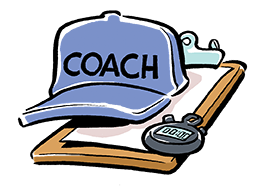 Greg Cravens
Greg Cravens
Get a Life (Coach)
You’re caught in a trap. You can’t get out. And, no, it’s not because I love you too much, baby.
“Usually, when people come to me, it’s because they’re stuck,” says Jen Frank, a professional life coach. “There’s something they might want, but they can’t move forward or they might feel a lack of clarity about the path they’re on. There’s just something that they haven’t been able to figure out by themselves.”
But Frank doesn’t give advice, won’t tell people what to do. She is not your therapist. “Therapy is really about past issues or past trauma,” she says. “Coaching acknowledges that those things happened but rather than go backward, it’s about recognizing how we’re going to get past it.”
Frank does life, career, and executive coaching, both individually and in groups. It usually takes from 10 to 12 weeks. Frank says that life and career coaching are ultimately the same thing. “Whatever that’s not working, it’s showing up in relationships at home and relationships at work. You’re a whole person. It overlaps.”
Frank begins by asking questions. “I ask them what prompted them to call me. We talk a little bit about where they want to get to,” she says.
They then work through exercises, which may involve drawing and storytelling. This is part of what she calls a values exercise. “If you want to learn about somebody, have them tell you a story about a time when they were proud.” Frank describes her visioning exercise as sort of like meditation, where the subconscious meets the conscious. She’ll have the client visit their future self for advice.
Coaching is about building confidence and promoting self awareness. Frank says that people are never as awful as they deem themselves to be. “I create a safe space because I’m completely nonjudgmental about all of people’s stuff,” Frank says. “I like their dark places. I see beauty in dark places.” — Susan Ellis
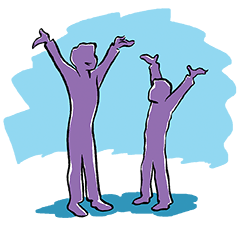 Greg Cravens
Greg Cravens
Mentor in Memphis
When I was in the fifth grade, I had the one and only speaking part I would ever have in all of my kindergarten-through-12th-grade school productions: “‘R’ stands for rewards. To better the lives of others is one of life’s greatest rewards.”
I don’t remember the context or what the occasion was now, but either the power of the words or the trauma of public speaking (let’s go with the former) caused that line to stick in my head all these years.
There are tons of ways to better other people’s lives here in Memphis that, believe it or not, could fulfill you, too. You could volunteer at a soup kitchen or build houses with Habitat for Humanity or read to elementary kids. The list goes on and on.
But, one way to really make a difference in someone’s life in a personal and intentional way is mentoring.
There are dozens of organizations in the city that need mentors. One of them is REACH Memphis, which exists to help Shelby County students succeed in high school and, subsequently, in college.
Lauran James, director of mentoring and volunteer services for REACH, says mentors play an integral part in the program, largely by helping students find direction.
“Mentors are needed across the board,” James says. “We have a crop of students that need direction. Our students just need positive guidance. And that’s what mentoring gets them. There would be no way we could do what we do without mentors.”
Meeting with students bi-monthly or weekly, mentors take on different roles, including helping students prepare for summer study programs at universities, career guidance, and college preparation, James says.
Though mentors must have at least two years of college education, James says the most important qualification is a “love for students and the desire for them to reach their highest potential.”
Many of the students come from underserved communities with parents who might not have attended college, and therefore without the program, have no idea how to prepare for a higher education, James says. “Those who aren’t getting mentors are missing out,” James says. “There’s no one to counsel them. Not one of the students who has gone through the program hasn’t said that it’s changed their life. It’s awesome and powerful.”
James says the benefits aren’t only reaped by the mentees either, as the mentors get the satisfaction of having a hands-on part of changing a person’s life. — Maya Smith
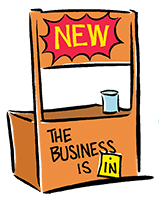 Greg Cravens
Greg Cravens
Start Your Own Business
This is the year. You’ve had that great idea swirling in your brain for months, years maybe. You can see your own small business in the distance. It’s bathed in a shimmering, golden light. A scene plays in your mind: You’re laughing and giving your boss the bird, while $100 bills blizzard you both. Then, the record skips. The daydream ends, and the vision of starting your business seems complicated and far away. But you still have that great idea. And this year — by god — you’re ready to begin your journey.
First step? Get yourself to the Benjamin L. Hooks Central Library (3030 Poplar) on Monday, January, 14th, at 6 p.m. There, you’ll find an event called Simple Steps 1: Starting Your Small Business. It will feature a speaker from the local branch of the Service Corps of Retired Executives (SCORE) to help get you started.
The class introduces key business concepts, including the myths and realities of entrepreneurship. It’ll also walk you through some of the legal and financial considerations of business ownership. It is one of a five-part series from SCORE to help prospective entrepreneurs.
Beth Behrens, a Memphis Public Library librarian in business and sciences, organizes at least three small-business education events at the library each month, and they can draw sometimes up to 100 people.
“We’re very accessible and free and open to the public,” Behrens said. “Other places may want [to charge for such events] but this is a free service.”
Behrens said the library also hosts other events with the Small Business Adminstration and the Tennessee Small Business Development Center. The library also has a small-business book collection, funded by First Tennessee Bank, that includes books (duh), DVDs, audiobooks, e-books, and more. — Toby Sells
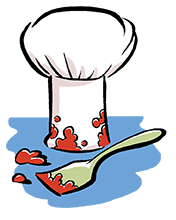 Greg Cravens
Greg Cravens
Learn How to Cook
If learning how to cook is your New Year’s Resolution, who better to ask for advice than Kelly English, chef/owner of Restaurant Iris and The Second Line?
English says you should begin by reading up on the subject. “Get some books of some chefs you like and read and go with the basics,” he says.
English’s pick is The New Professional Chef by the Culinary Institute of America. “It’s the most comprehensive book of all the basics and the reason why things are and the reason why they should be.” It defines cooking terms, including “braise” and other mysteries of the kitchen.
As for those basics, one of them is to know “how to use seasoning. Really, salt. Like a lot of times you go to a restaurant and you say, ‘Oh, my God. This is the best whatever it can be.’ It can be any restaurant. And you want to know what they put on it. Usually the answer is salt and pepper.”
Another basic is to “practice things like knife cuts. When you cut your vegetables and they’re all the same size, they cook evenly.”
English says it’s important to get to know your stove. “Your stove has more settings than ‘off’ and all the way on ‘high.'” It’s important to know when to use different heat on your stove. “Heat is an important thing to grasp,” English says.
It’s also a good idea to watch TV cooking shows. Salt, Fat, Acid, Heat on Netflix is a great one, English says.
Get good cooking equipment. “A really sharp knife is important,” says English. “A really sharp knife is less dangerous than a dull knife. Any time you have to use a lot of pressure with a dull knife, that’s when you end up cutting yourself.” And, he says, “You don’t have to get the most expensive set of knives. But you do need to keep them sharp.”
Next: “A good cutting board you keep clean. I like wood.” And “a good set of cast iron” and “a good non-stick skillet.” Metal bowls — as in stainless steel — are also on the list.
Finally, English says, it’s important to measure everything. So, get “one of those sets of measuring cups and measuring spoons.” — Michael Donahue
Go Keto
U.S. News & World Reports says the Mediterranean diet is the best, overall. The Today Show predicts your Facebook friends will be all about the flexitarian diet this year. I won’t make any recommendations or predictions. (I’m not a doctor or a psychic.) But you should check out this October Facebook post from Memphis’ own Jacqueline Luisa Maria “Five Names” Sparks-Davila: “Game changer alert: Central BBQ nachos, (substitute) pork rinds. Sneak in your own sugar-free BBQ sauce and hold the nacho cheese sauce = low carb/keto meal dream.”
Sounds like a Memphis diet I can get behind.
By now, you or someone you know (maybe an annoying Facebook friend) has extolled the virtues of a low-carb diet, maybe the paleo or keto variety, where you replace grains, sugars, and processed foods with fats, protein, vegetables, and, y’know, “real” food.
Sparks-Davila began her keto (and sobriety) journey around the 2017 new year. She’s since said goodbye to 50 pounds and now describes her life as “true happiness.”
“It has honestly been life-changing,” she says. “I struggled with an addiction to carbs and sugars as well as binge eating. Keto successfully helped me change my eating habits, curbed the cravings, and helped me form a healthy relationship with food.”
Sparks-Davila says that her diet might not be for everyone and adds that you should check with your doctor first. But, if you can, it might worth a shot. You can still eat at your favorite Memphis joints. Sparks-Davila says, for example, that Slider Inn “will be happy to wrap any of your sliders in lettuce.” And just think about those barbecue nachos at Central. Dang.
If you need further help or inspiration, Sparks-Davila plans to launch her Sparkle and Keto! YouTube channel this year. She’ll share her story, tips and tricks, and keto cooking and baking videos. — Toby Sells
Try Yogalele
Learning to play a musical instrument as an adult is tough. Your fingers don’t move like that! And between work and yoga, who has time to practice?
If you’ve ever tried to learn an instrument and failed, you may want to reconsider the humble ukulele. And if you’re worried that learning to play ukulele might cut into your yoga time, take comfort in knowing that, thanks to ukulele and yoga instructor Misti Rae Holton, Yogalele is a real thing that exists in the world.
Holton teaches jazz classes and swing classes and group classes, and she’s begun to combine yoga and ukulele classes into this thing she calls yogalele. But she likes teaching beginners best, and for folks who like seeing fast results, she says it’s not uncommon for starters to leave their first uke lesson playing between four and six songs.
“I was working at Midtown Music when my boss told me, ‘you’re going to teach a group ukulele lesson to a grandmother and her two grandkids,'” Holton says, describing an unanticipated assignment that sparked an even more unanticipated career expansion.
“I’d never taught a music lesson in my life, but it ended up being an amazing experience because ukulele is so easy to teach and learn,” she says. “It hit me immediately that this is the most accessible way for people to learn and start playing songs. It was magical for me.”
“Usually we do yoga first, then we play ukulele,” she says. “But I do combine them.”
Trends come and go, but the Memphis ukulele community is strong and growing. All 17 branches of the Memphis Public Library have donated ukuleles and free classes are available. Weekly meeting of the Memphis Ukulele Flash Mob brings close to 100 people to Central BBQ every Tuesday between 6 and 8 p.m. Those who start learning to play now may even be ready to participate in impromptu jams by the time Memphis hosts its first ukulele festival, April 23rd-26th at the Warehouse. — Chris Davis
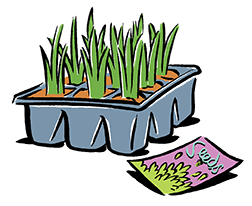 Greg Cravens
Greg Cravens
Grow a Garden
Gardening is one healthy habit. Research has shown that working in the dirt can significantly improve one’s mood and immune system, due to contact with microbes in the soil biome, which mix with the microbes in our own guts. On a more terrestrial scale, you and yours can enjoy the flavor and vitality of a fresh-picked harvest some weeks or months later, barring any droughts or plagues of locusts.
January is just the time to start planning a garden. Plenty of greens, legumes, and root crops can be planted in a month or two, and even plantings after the last freeze can benefit from you picking your spot and prepping the soil now. For starters, it’s better to think of your dirt less as a mud pie and more like a giant lung. Ideally, you’ll be creating a plant bed that’s inhaling and exhaling air and water, with plenty of organic matter to break down in the process. That means considering the air flow above and below ground level, as plant health improves with circulation; low plots of land can hinder such flow and pool water to boot.
Low land is also more prone to compaction. That’s not conducive to soil respiration or friendly to every farmer’s friend, the lowly worm. It’s just one thing to keep in mind when choosing a site. Avoid gardening near walnut or hickory trees, as they secrete the plant-inhibiting toxin juglone. And naturally, you’ll want a spot with plenty of sunshine; though areas with a couple hours of summer shade can help cool-weather crops thrive longer.
If you’re installing raised beds, compaction won’t be a problem, but be aware that they dry out easier, come summer. If you’re opting for bare ground you can eventually till, note that many farmers use a broadfork to poke deep holes in their earth; a yard aerator or a even a potato fork, stepped into the ground every few inches, can approximate the effect. You can then throw compost over the area, and even cardboard and leaves over that. Later, when the ground is drier, you can spade or till up the area, incorporating the compost into your pre-aerated bed: a paradise for practically any kind of crop you care to grow. — Alex Greene
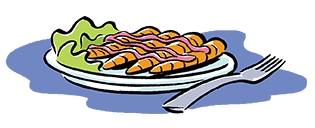 Greg Cravens
Greg Cravens
Go Vegan
My original thought was to interview my family relations in Atlanta about their dietary regimen by way of suggesting a new path in personal behavior. My 16-year-old granddaughter Eva responded in written form, as follows, and I would not presume to try to improve upon what she said. — Jackson Baker
I went vegan three years ago because I love animals. However, I constantly hear arguments about my decision. Veganism is better for your health, helps the environment, and is an ethical lifestyle choice. So what’s the problem? I often get the question, “Where do you get your protein from?” Despite the fact that I don’t consume animal products, I get plenty of protein from plant-based foods such as grains, nuts, beans, and even vegetables. Did you know that per calorie, broccoli has more protein than beef? Veganism is also beneficial to the environment. Did you know that animal agriculture is a leading cause of climate change? As difficult as it is to imagine, you could fill up a swimming pool with the amount of water it takes to make one person a week’s worth of hamburgers.
As we start a new year, a vegan diet is a healthy choice because it lowers cholesterol, reduces risk of cancer and diabetes, and can help you live a longer, healthier life. Because I’m only 16, I am mostly concerned with the immediate effects of going vegan. I have lost weight and became more energetic on the diet. I often hear people say that they could never go vegan because it’s too difficult. I thought the same thing before I went vegan, but I soon got used to it. There is a vegan version of everything now, even Oreos and Coke. Going vegan will also make you feel better about your ethical choices. I was raised as a vegetarian, but wish I’d known that the egg and dairy industries kill just as many animals as the meat industry. I love animals, and I feel so much better knowing that I am helping to save lives. My only regret about going vegan is not doing it sooner. — Eva Baker
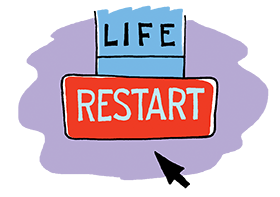 Greg Cravens
Greg Cravens
Transform Yourself
Do you want to transform yourself into a new you for the new year, but you’re not sure how? You can start by looking to the movies for examples. Since character change is vital to a satisfying story, films and television are full of people transforming themselves.
Take the Transformers, for example. Bumblebee, now in theaters, is the sixth film about robots from the planet Cybertron who transform themselves into cars for … reasons. The films have earned a combined $4 billion at the box office, so they must be doing something right.
On the other hand, Transformers movies are terrible, and transforming yourself into a car is not really something you can do in real life. God knows I’ve tried.
For a more useful personal transformation template, look to superheros. Sure, Aquaman, who ruled the holiday box office as well as the Atlantean depths, was born that way, but many superheroes undergo a life-changing tranformation before they start fighting crime in tights. The star of Spider-Man: Into the Spider-Verse was bitten by radioactive spiders, thus gaining the strength, grace, and wall-crawling ability of an arachnid. Again, this is not great life advice. First of all, radioactive spiders aren’t a thing. If you irradiate a spider enough, it’s just going to die. Assuming there was a spider with radioactive venom, and it bit you, you wouldn’t get superpowers — you’d get leukemia.
A better superhero template for self transformation is Batman. He doesn’t have any impossible superpowers, he’s just a guy who does a lot of push-ups. Batman’s superpower is his will. He’s determined, he’s thought the situation through like a true paranoid who dresses up like a bat at night, and he’s used his vast fortune to prepare for all possible contingencies. As they say on the internet: Always be yourself — unless you can be Batman. So there you have it. If you want a new you for the new year, all you need is a transformative childhood trauma, superhuman willpower, and unlimited dynastic wealth. Good luck! — Chris McCoy